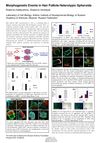 30 citations,
October 2020 in “Nature Communications”
30 citations,
October 2020 in “Nature Communications” Finasteride irreversibly affects human steroid 5α-reductase 2, providing insight into its catalytic mechanism and disease-related mutations.
 21 citations,
January 2020 in “General and Comparative Endocrinology”
21 citations,
January 2020 in “General and Comparative Endocrinology” Lack or blocking of SRD5a, a key component in hormone creation, can lead to conditions like pseudohermaphrodism and affect hair growth, bone mass, muscle strength, and reproductive health. More research is needed on its regulation from fertilization to adulthood.
 20 citations,
January 2008 in “Reproductive Biomedicine Online”
20 citations,
January 2008 in “Reproductive Biomedicine Online” Sexual orientation does not affect the prevalence of PCOS or fertility rates in women undergoing artificial donor insemination.
[object Object]  20 citations,
March 2005 in “Current Medicinal Chemistry”
20 citations,
March 2005 in “Current Medicinal Chemistry” New compounds show promise for treating hair loss, enlarged prostate, and prostate cancer, with some being more effective and having different side effects than current treatments.
 18 citations,
March 2020 in “Frontiers in Neuroendocrinology”
18 citations,
March 2020 in “Frontiers in Neuroendocrinology” The enzymes 5α-reductase and 3α/β-hydroxysteroid oxidoreductase help create brain-active substances from progesterone and testosterone, which could be used for treatment, but more research is needed to ensure their safety and effectiveness.
 17 citations,
August 2011 in “Current Medicinal Chemistry”
17 citations,
August 2011 in “Current Medicinal Chemistry” New treatments for enlarged prostate are being developed, some of which may be more effective than current medications.
 13 citations,
January 2020 in “Neuroscience”
13 citations,
January 2020 in “Neuroscience” Blocking 5α-reductase can harm memory and brain structure, and increase harmful brain changes in male mice used for Alzheimer's disease research.
 13 citations,
August 1995 in “The Journal of Steroid Biochemistry and Molecular Biology”
13 citations,
August 1995 in “The Journal of Steroid Biochemistry and Molecular Biology” The activity of a specific rat enzyme in the prostate and epididymis is highly dependent on the acidity level.
 12 citations,
April 2018 in “Physiology & Behavior”
12 citations,
April 2018 in “Physiology & Behavior” Finasteride raises suicide-linked aggression and stops clozapine's positive effects in schizophrenia animals.
 11 citations,
December 2018 in “Bone”
11 citations,
December 2018 in “Bone” Removing a methyl group from the ITGAV gene speeds up bone formation in a specific type of bone disease model.
 9 citations,
October 1993 in “The Journal of Clinical Pharmacology”
9 citations,
October 1993 in “The Journal of Clinical Pharmacology” Finasteride doesn't affect antipyrine metabolism, so interactions with cytochrome P-450 enzyme drugs are unlikely.
 8 citations,
May 2021 in “Journal of the European Academy of Dermatology and Venereology”
8 citations,
May 2021 in “Journal of the European Academy of Dermatology and Venereology” A COVID-19 patient had unusual nail discoloration and nail separation possibly due to the virus's effects on small blood vessels.
 5 citations,
August 2018 in “Sexual Medicine Reviews”
5 citations,
August 2018 in “Sexual Medicine Reviews” 5α-Reductase inhibitors do not consistently increase testosterone levels in the blood.
 4 citations,
November 2022 in “Frontiers in endocrinology”
4 citations,
November 2022 in “Frontiers in endocrinology” The enzyme 5α-reductase type 1 is important for blood vessel development and fertility in the uterus.
 4 citations,
August 2010 in “Acta Biologica Hungarica”
4 citations,
August 2010 in “Acta Biologica Hungarica” New steroidal compounds moderately block an enzyme related to testosterone conversion, less effectively than finasteride.
 January 2024 in “Archives of Endocrinology and Metabolism”
January 2024 in “Archives of Endocrinology and Metabolism” A new gene mutation causes insulin resistance in a girl and her mother.
 May 2022 in “bioRxiv (Cold Spring Harbor Laboratory)”
May 2022 in “bioRxiv (Cold Spring Harbor Laboratory)” The enzyme 5α-reductase is important for proper blood vessel development during the fertility-related transformation of the uterus lining.

Researchers developed a method to create artificial hair follicles that may help with hair loss treatment and research.
 September 2008 in “Fertility and Sterility”
September 2008 in “Fertility and Sterility” Exposure to fatty acids significantly increased androgen levels in female dogs, suggesting a link to conditions like insulin resistance and PCOS.
 April 1981 in “Pediatric research”
April 1981 in “Pediatric research” Copper treatments increase copper in all tissues, but brindled female mice accumulate much more copper in their kidneys without clinical effects, unlike brindled male mice where brain copper deficiency is clinically significant.
 115 citations,
October 2009 in “The Journal of clinical endocrinology and metabolism/Journal of clinical endocrinology & metabolism”
115 citations,
October 2009 in “The Journal of clinical endocrinology and metabolism/Journal of clinical endocrinology & metabolism” The research found that Atypical Progeroid Syndrome has unique symptoms and is not caused by the buildup of a certain mutant protein.
[object Object]  75 citations,
January 2014 in “Korean Journal of Urology”
75 citations,
January 2014 in “Korean Journal of Urology” 5α-reductase inhibitors can cause sexual problems, higher risk of aggressive prostate cancer, and depression.
 66 citations,
April 2017 in “International Journal of Andrology”
66 citations,
April 2017 in “International Journal of Andrology” Men taking 5α-reductase inhibitors for enlarged prostate have a higher chance of experiencing reduced sexual desire and erectile dysfunction.
 42 citations,
September 2015 in “Gene”
42 citations,
September 2015 in “Gene” FGF5s can block the effects of FGF5, which may help control hair growth in cashmere goats.
 23 citations,
July 1993 in “Pharmacotherapy”
23 citations,
July 1993 in “Pharmacotherapy” Finasteride treats enlarged prostate and baldness, but may cause limited urinary improvement and sex-related side effects.
 20 citations,
February 2002 in “Expert Opinion on Therapeutic Patents”
20 citations,
February 2002 in “Expert Opinion on Therapeutic Patents” New research is needed to create better drugs that block the enzyme responsible for conditions like male baldness and prostate enlargement.
 18 citations,
June 2017 in “Proceedings of the National Academy of Sciences of the United States of America”
18 citations,
June 2017 in “Proceedings of the National Academy of Sciences of the United States of America” A gene called Gk5 controls lipid production in the skin and affects hair growth.
 18 citations,
January 2003 in “Gynecological Endocrinology”
18 citations,
January 2003 in “Gynecological Endocrinology” Low-dose finasteride effectively reduces hirsutism without serious side-effects.
 13 citations,
March 2020 in “Genes”
13 citations,
March 2020 in “Genes” Disrupting the FGF5 gene in rabbits leads to longer hair by extending the hair growth phase.
 13 citations,
June 2013 in “Actas Dermo-Sifiliográficas”
13 citations,
June 2013 in “Actas Dermo-Sifiliográficas” Syphilitic alopecia, linked to syphilis and high-risk sexual behavior, improves with penicillin treatment.






























